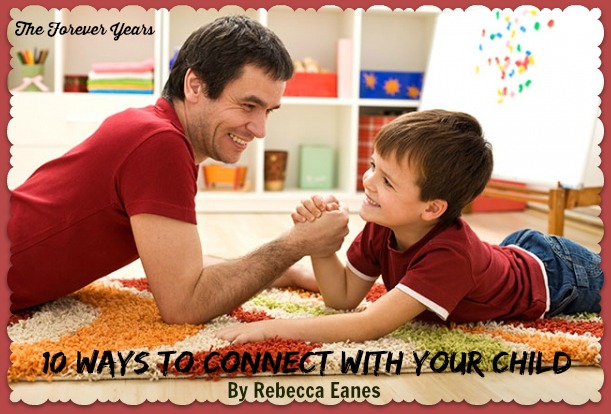Our connection to our children means everything.
It means the difference between a confident child and an insecure one. It means the difference between a cooperative child and a defiant one. Our early attachments and ongoing connection to our children fostered through love, nurturance, and guidance is a strong predictor of our child’s success in many areas of life.
We’ve heard a lot about attachment, so the concept and importance of bonding with our baby seems obvious. Just because your little one has grown to become a lot bigger, smellier, and sassier doesn’t mean your bond and connection with them is any less vital to their development. In fact, it continues to be of the utmost importance throughout childhood.
Life with kids is busy. It’s not uncommon at the end of the day to find yourself wondering whether you even sat face to face with your child. Here’s the good news: You’re likely already engaging with your child in activities that promote a strong parent-child relationship.
Reading
We all know reading with children is a simple way to improve their language and reading skills. But research also shows that reading with children actually stimulates patterns of brain development responsible for connection and bonding.
This makes sense when we consider that story time usually involves cuddling, eye contact, and shared emotion. If you make reading together a priority in your home, you are without a doubt connecting with your child.
Art
Engaging in art or craft activities with children is an awesome way to provide not only a fun and enjoyable experience, but a therapeutic one as well. No matter their age, you’ll be hard pressed to find a child who can’t find an art medium that interests him.
When engaged in a creative process with children, we provide an outlet for them to express their thoughts and feelings. This is especially true with younger children, who aren’t yet able to verbalize their complex emotions. When your child has access to acreative outlet, odds are that interactions between the two of you will be more positive.
Music
Whether listening to them play an instrument or dancing to the “Trolls” soundtrack together, music offers lots of benefits for both parent and child, including bringing our awareness into our bodies and into the current moment. Your kids will be practicing mindfulness without even knowing it!
It’s pretty difficult to focus on a mistake at school yesterday or the test coming up tomorrow when we’re busy processing auditory input as well as coordinating our motor skills.
Nature
Feeling stressed? Stress is often a huge barrier to parents engaging with their children. Spending time with your child out in nature will go a long way to increase emotional health and physical well-being for both parties.
Research tells us that exposure to nature reduces our blood pressure, heart rate, muscle tension, as well as the production of stress hormones. Nature is no joke. Even if you don’t have time to go for a hike, simply water a plant together. These studies show similar effects can be derived from even small amounts of nature.
Play
Play is the language of children, so it only makes sense that we should try to connect with them though something that comes so naturally. When parents enter their child’s world and follow their lead in play, they open up the possibility for many positive outcomes, including taking on a different relationship role and seeing our children from a new perspective.
(To read more of this post, please follow the link below…)
http://www.parent.co/10-simple-ways-to-build-an-unbreakable-bond-with-your-child/






